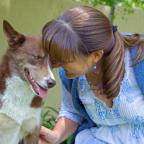
Summer safety: Vet Nurse issues warm weather warning ahead of summer to pet owners
June sees the start of the summer season, and hopefully the beginning of some summer sunshine! The change in season brings new pet dangers to be mindful of - last year PDSA treated just over 300 cases of heatstroke.
PDSA Vet Nurse Nina Downing shares her advice on how to protect pets from hot weather dangers before the warmer temperatures hit.
Keeping pets cool
"Whatever the weather, you should never leave your pet in enclosed, unventilated spaces, such as cars, vans, hutches, tents, caravans, or sheds. Even humans find it unbearable sitting in a conservatory for too long on a hot day.
"Remember dogs die in hot cars. Most people believe it will never happen to their pet, yet every year dogs continue to die in hot cars. Cars can quickly heat up to dangerously high temperatures, even when it's not particularly hot outside – for example on a 22°C day the inside of a car can reach an unbearable 47°C within an hour, so never leave a pet in the car unattended, not even for a couple of minutes!
"Limit journeys during hot weather to necessary ones only. Use air conditioning to keep the car cool while you are driving, or have windows open to create a cooling draught. Your pet should be restrained in the car by law, so you shouldn't have to worry that they'll be in danger of escaping. Sun shields are useful to prevent the heat of the sun from beaming down on them whilst you are driving.
"Other pets are at risk of heat related illness too. Be sure that cats have access to your home or have a safe space to retreat to that is cool and shaded, with fresh clean water available at all times. Small pets such as rabbits and guinea pigs also need to have shelter from the heat so moving their run and hutch into a more shady spot will mean they have somewhere comfortable to relax and keep cool. You can provide covered ice packs that they can lie next to as an added help for them. Check that their water bottles are kept out of direct sunlight and offer water bowls too, so they have multiple water sources that are cool and fresh.
"Remember that very small pets that live indoors should be kept out of direct sunlight too, otherwise their temperature can become dangerously high.
Skip a walk, save a life
"Dogs also die on hot walks, nearly three quarters of heatstroke cases in dogs happen whilst playing and exercising in hot weather. Though your dog might typically enjoy long walks and frolicking around in the garden, it's best to stay indoors during the hottest parts of the day. This is traditionally thought of as between12-3pm, however during a heatwave this could extend to most hours of the day. So if you're planning on being outside at all, aim for early morning or late evening. If it's very hot and the weather feels draining, skipping a walk may be the safest option. Playing some games in the house instead will keep your pets mentally and physically active. In very hot weather though, your pets might sleep and prefer to rest, so work with them, they'll let you know if they're getting bored and wanting to some fun indoors.
"If you do venture out at the cooler parts of the day, avoid strenuous exercise like running or games of fetch. Instead, stick to gentle walking in shaded places, allow your pup plenty of time to sniff, which helps keep their brain active as well as their legs.
Be prepared with pet first aid
"Recognising heatstroke and knowing what to do if your pet is suffering from it can make a huge difference to their recovery. If you suspect your pet is suffering from heatstroke, immediately move them into the shade or a cool room and start to bring their temperature down using cool water", continued Nina.
"Once in a cooler area, gently pour cool tap water over their whole body, avoiding their nose and mouth. Go slowly so they don't panic and aim to soak their whole body. Try to create a breeze (use a fan, air-con, or open doors and windows). Offer them a drink of cold water (but don't force them to drink) and put them on top of a cool wet towel.
"Wrap an ice pack or bag of frozen veg in a towel and place it in between their thighs (if they are small, place your pet on top of it). Make sure that you call your vet for advice on what to do next. As much as you may wish to comfort them, don't cuddle your pet or cover them with a wet towel, as this will make them even hotter."
For more information on heatstroke visit www.pdsa.org.uk/heatstroke
Are some pets more likely to overheat than others?
"Most pets can feel uncomfortable on hot days, just like us. However, due to breed, age or health conditions, some dogs and cats may struggle more than others. Flat-faced dogs and cats are more at risk of developing heatstroke, as well as dogs that have thicker coats. Giant dog breeds can also struggle to keep cool, as well as pets that are overweight. Older dogs and those with ongoing health problems also find it more difficult to manage their body temperature, so this pets may need a little more TLC to help them keep safe, cool and hydrated."
PDSA is the vet charity for pets in need, providing a vital service for pets across the UK whose owners struggle to afford treatment costs for their sick and injured pets. For many vulnerable pets, PDSA is there to help when there is nowhere else for their owners to turn. Support from players of People's Postcode Lottery helps us reach even more pet owners with vital advice and information.







